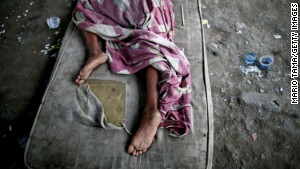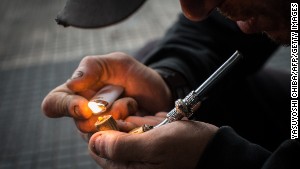Brazil wrestles with crack epidemic as it gears up for World Cup
It's called "cracolandia" -- crackland -- where drug users crouch underneath plastic tarps and shuffle down a dimly lit road like modern-day zombies.
One young woman in jean shorts wanders by, pushing a babycarriage piled high with garbage. There are stacks of disposable plastic water cups used as improvised crack pipes.
Brazil has surpassed the United States as the world's No.1 consumer of crack cocaine, according to the Federal University of Sao Paulo. It shares borders with the world's biggest cocaine-producing countries -- Colombia, Peru and Bolivia. Strong economic growth has meant more disposable income for everything from microwave ovens to drugs.
North of the famed Maracana soccer stadium in Rio de Janeiro, users in "cracolandia" openly smoke the small, single-hit balls that cost 5 reais, or about $2.20. There are between 300 and 400 people camped out at this crack haven every night.
One, Zair, rests on crutches as he lights up.
A drug user rests beneath an overpass in a Rio shantytown.
"People say crack is the drug of death, but I don't think it is," he said, laughing. "I've been smoking for eight years."
Tatiana sits on a stained couch nearby. She turns tricks in exchange for crack. When asked whether she wants to get off the streets, she shakes her head and asks for a lighter.
Brazil is in the middle of a drug epidemic as it prepares to host the World Cup soccer tournament in 12 cities beginning in June. Billboards reading "Crack. Freedom or death" line highways leading to cities and to small farming towns. Officials have launched a string of initiatives to address the addiction with mixed results. Critics say the focus has been on cleaning up the streets rather than specifically addressing the causes of addiction or providing solutions for users.
Others are trying to help.
One night a week, volunteers from the Evangelical Love of God Church drive to Rio de Janeiro's crack havens in their battered VW van with vats of food.
Crack users wait in line for bowls of spaghetti and bow their heads in prayer with the volunteers, themselves recovering addicts.
Robson has been free of drugs for three months now. He reads from the Bible and wraps those he recognizes in bear hugs.
Another city, another Cracolandia: An addict lights an improvised pipe in downtown Sao Paulo.
"I'm giving witness, showing them what God can do if they're willing," he said. A security guard with a wife and children, Robson used drugs for a decade before getting hooked on crack cocaine.
"It was like love at first sight," he said. "But it stole my personality, my whole being." He ended up on the very same streets where he now works, trying to save lost souls.
"Look at them. They all had lives and families, but they're enslaved by drugs," he said.
After every visit, a few more people end up back at the dilapidated shelter and rehab center built on the roof of the warehouse-style Evangelical Love of God Church.
They sleep on beds crammed 14 to a room and cook meals over open fires. They spend their days in prayer and doing chores: cooking, cleaning, cutting hair. After evening prayer service, they walk to the local football court, sweating it out in two-hour matches.
The church was founded by the Rev. Celio Ricardo and his wife. Ricardo says he started using cocaine when he was 15 and wasn't able to break the addiction until he discovered religion.
"You can only understand tears if you've cried. I know their weaknesses," he said.
Ricardo veers between shouts and tears during his sermons. The recovering addicts and their families fill the pews. Men shake like possessed souls and collapse on the floor.
Ricardo encourages the men to live at the rehab center for at least nine months to avoid temptation while they try to break free from their addictions. Nonetheless, two-thirds of them relapse.
"But they have our address when they're ready," Ricardo said. "They know where they can get help, where they can find people who believe they can change."
Robson is back at the makeshift shelter for the second time, but he's optimistic it will be his last. He dreams of being sober in time for his daughter's 15th birthday.
"For the first time, will I be there with her standing next to the cake?" he asked and flashed a huge smile. He's clean and has the motivation. But he also knows he has fallen before


Keine Kommentare:
Kommentar veröffentlichen